
The Most Excellent Order of the British Empire is a British order of chivalry, rewarding contributions to the arts and sciences, work with charitable and welfare organisations, and public service outside the civil service. It was established on 4 June 1917 by King George V and comprises five classes across both civil and military divisions, the most senior two of which make the recipient either a knight if male or dame if female. There is also the related British Empire Medal, whose recipients are affiliated with, but not members of, the order.
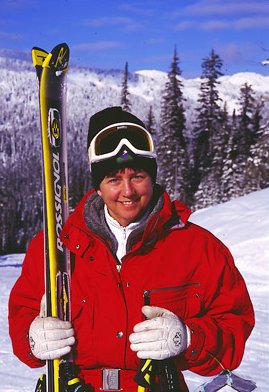
Nancy Catherine Greene Raine is a Canadian former Senator for British Columbia and an Olympic alpine skier voted as Canada's Female Athlete of the 20th Century. She was born in Ottawa, Ontario, Canada. Greene Raine won the giant slalom in the 1968 Winter Olympics in Grenoble, France.

The Order of Ontario is the most prestigious official honour in the Canadian province of Ontario. Instituted in 1986 by Lieutenant Governor Lincoln Alexander, on the advice of the Cabinet under Premier David Peterson, the civilian order is administered by the Lieutenant Governor-in-Council and is intended to honour current or former Ontario residents for conspicuous achievements in any field.
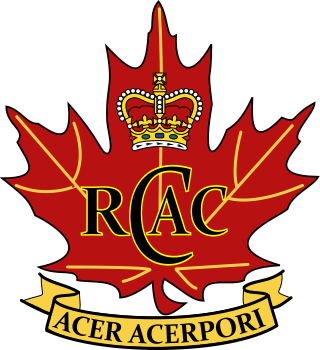
The Royal Canadian Army Cadets is a national Canadian youth program sponsored by the Canadian Armed Forces and the civilian Army Cadet League of Canada. Under the authority of the National Defence Act, the program is administered by the Canadian Armed Forces and funded through the Department of National Defence. Additionally, the civilian partner of the Royal Canadian Army Cadets, the Army Cadet League of Canada, also ensures financial, accommodations and transportation support for RCAC programs and services at a community level.
The orders, decorations, and medals of Canada comprise a complex system by which Canadians are honoured by the country's sovereign for actions or deeds that benefit their community or the country at large. Modelled on its British predecessor, the structure originated in the 1930s, but began to come to full fruition at the time of Canada's centennial in 1967, with the establishment of the Order of Canada, and has since grown in both size and scope to include dynastic and national orders, state, civil, and military decorations; and various campaign medals. The monarch in right of each Canadian province also issues distinct orders and medals to honour residents for work performed in just their province. The provincial honours, as with some of their national counterparts, grant the use of post-nominal letters and or supporters and other devices to be used on personal coats of arms.
The orders, decorations, and medals of the Canadian provinces, in which each province of Canada has devised a system of orders and other awards to honour residents for actions or deeds that benefit their local community or province, are in turn subsumed within the Canadian honours system. Each province sets its own rules and criteria for eligibility and also for how each award is presented. Most of the awards allow for the recipients to wear their awards in public, and most grant the recipients the use of post-nominal letters after their names. Not all of the awards listed below are part of the Canadian honours system, thus some of them may not be worn or court mounted with awards that are part of the Canadian honours system.
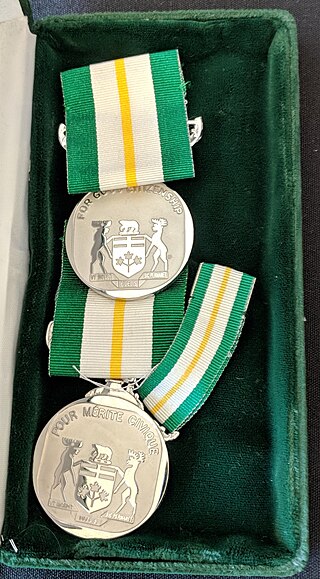
The Queen Elizabeth II Ontario Medal for Good Citizenship is a provincial medal of merit awarded in the Canadian province of Ontario. It was established by the Government of Ontario in 1973 to recognize people who, through exceptional long-term efforts, have made outstanding contributions to the well-being of their communities and whose assistance is given without expectation of remuneration or reward. Originally established as the Province of Ontario Medal for Good Citizenship, the award was renamed in 2023 to honour the late Queen Elizabeth II. Typically, eleven to thirteen medals are awarded each year.
The following is the Canadian order of precedence for decorations and medals in the Canadian Honours System. Where applicable, post-nominal letters are indicated.
The Saskatchewan Volunteer Medal (SVM) is a civil decoration for volunteers in the Canadian province of Saskatchewan, introduced in 1995 by the Government of Saskatchewan. Prior to the establishment of the medal volunteerism could be recognized by the Saskatchewan Order of Merit, but this is only one of the fields for which the Order is presented. The medal was established to remedy inadequate recognition of volunteerism by the provincial government.
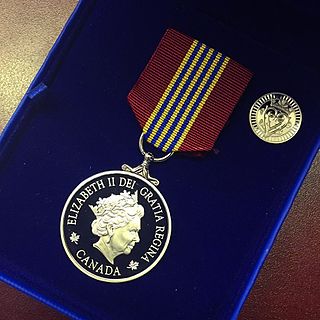
The Sovereign's Medal for Volunteers is a Canadian medal intended to honour volunteers who have made a significant and continual contribution to their community, either in Canada or abroad. The medal was initially conceived by Governor General Roméo LeBlanc as the Governor General's Caring Canadian Award and created in November 1995, to award volunteers. It was replaced on 15 July 2015 by the Sovereign's Medal for Volunteers.
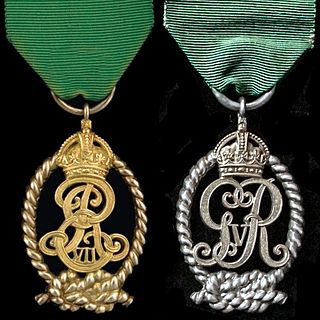
The Decoration for Officers of the Royal Naval Volunteer Reserve, post-nominal letters VD until c. 1947 and VRD thereafter, was instituted in 1908. It could be awarded to part-time commissioned officers in the United Kingdom's Royal Naval Volunteer Reserve after twenty years of service as efficient and thoroughly capable officers. The decoration was a Naval version of the Volunteer Officers' Decoration and its successor, the Territorial Decoration.

The Governor General's Academic Medal is awarded to the student graduating with the highest grade point average from a Canadian high school, college or university program. They are presented by the educational institution on behalf of the Governor General. These medals are not part of the Canadian Honours System. Since 2020, none of the medals have been created, and a placeholder has been located on the Governor General's website stating that the medals will be delivered sometime in the future. While consistently noting how Governor General Mary Simon holds the program in "high regard," as of December 2021, the Governor General's office said the medals would be sent in "summer 2022;" as of April 2022, the office said "fall 2022;" and, as of December 2022, the office said "in the months to come."
The Ontario Medal for Young Volunteers is an honour presented annually by the Lieutenant Governor of Ontario for outstanding contributions by young volunteers in the province of Ontario. The medal is not part of the Canadian honours system and therefore cannot be worn with medals that are part of the Canadian Honours system.

Frank George Gross, OMC was a philanthropist awarded the Ontario Medal for Good Citizenship (OMC) one month after his death in 2006. He is the only Chatham-Kent resident to be recognized by the Government of Ontario for humanitarianism.
Donald Blake Rix, was a Canadian pathologist, philanthropist, community volunteer, and businessman. He was the founder and chair of MDS Metro Laboratory Services, the largest private medical laboratory in Western Canada.
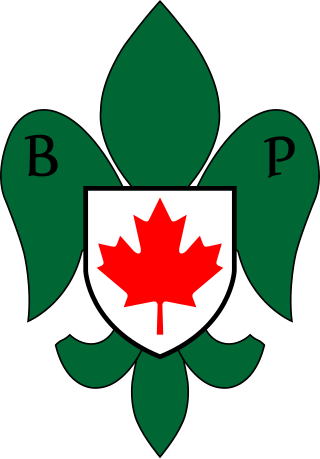
The BPSA in Canada was established in Victoria, British Columbia in 1996 as The Baden-Powell Scouts' Association of Canada (B-PSAC), rejecting the perceived modernization of the Scout method by Scouts Canada and sharing its aims with the other branches of the B-PSA. It is affiliated with the World Federation of Independent Scouts. The association was incorporated in British Columbia in 2000.
Joseph (Joe) Roberts also known as the "Skidrow CEO" is a Canadian motivational speaker, author, youth homelessness advocate and co-founder of The Push for Change Foundation. Roberts experienced drug addiction and chronic homelessness as a youth and entered drug treatment in 1991. Roberts worked in sales and web development before he became an inspirational keynote speaker. Roberts is the author of four books.
The Peace Officer Exemplary Service Medal is a Canadian service medal for peace officers. The medal honours 20 years of exemplary service by peace officers as designated by the governor general. It is, within the Canadian system of honours, the sixth and newest of the exemplary service medals.

The Royal Naval Volunteer Reserve Long Service and Good Conduct Medal, initially designated the Royal Naval Volunteer Reserve Long Service Medal, was instituted in 1908. It could be awarded to part-time ratings in the United Kingdom's Royal Naval Volunteer Reserve after twelve years of service and good conduct. The medal was a Naval version of the Volunteer Long Service Medal and its successor, the Territorial Force Efficiency Medal.










